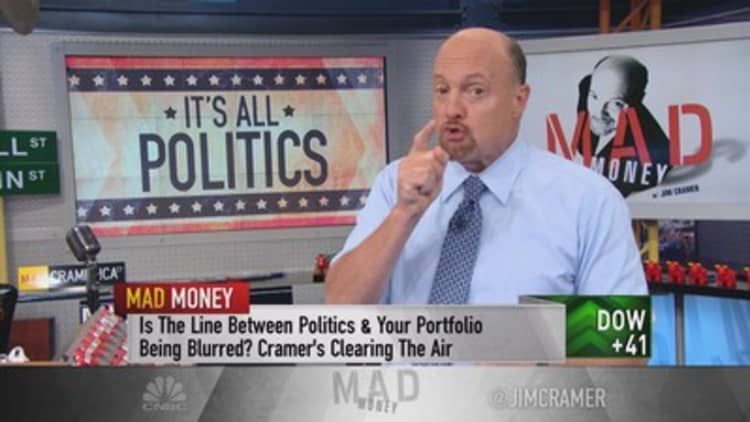
Jim Cramer is seeing strong signals from stocks that Hillary Clinton is not only just pulling away from Donald Trump in the 2016 election polls, but that Democrats could be ready to sweep both houses of Congress.
This is a major reason why stocks haven't been performing as well as expected, he said.
"I think it is important to frame the stock market in the context of a potential Democratic landslide come election day," the "Mad Money" host said.
If there was democratic domination, Cramer expects to see the more radical democratic views of big business to become elevated — a la Vermont senator Bernie Sanders or Massachusetts firebrand Elizabeth Warren.
While the government does intervene in the private sector in many different ways, this could mean that some areas will become more visible than others.
"The most visible areas are banking, healthcare and the environment, where rules are made that can make-or-break a company's earnings per share," Cramer said.
This group could be 'annihilated'
Money managers are worried about a Democratic landslide come election day, so they are selling anything that the government could potentially squelch
If both houses of Congress were to go democratic, it could put the banks back in Washington's crosshairs, Cramer said. That means more regulation and multiple discussions on whether banks are too powerful.
The Glass-Steagall Act was implemented by Congress in 1933, and previously prevented client money from being co-mingled. The law was repealed 17 years ago, and now banks can co-mingle two different kinds of businesses under one roof. After the financial crisis, Congress passed the Volker rule, which eliminated many risky practices.
"If the Glass-Steagall were to be revived — something that would become a distinct possibility — companies like Bank of America, JPMorgan and Citigroup would literally be torn asunder. They would be dismantled," Cramer said.
Thus, Cramer thinks a democratic wave on Election Day could be a nightmare for the financials, and the stocks are clearly indicating that it could happen.
Drug stocks and pharmaceutical companies could feel the pain, too. On Johnson & Johnson's conference call on Tuesday following earnings, Cramer heard California Proposition 61 brought up. This is a ballot initiative that would allow the state to demand Veterans' Administration prices for the drugs it buys.
The VA pays the lowest prices of any government agency, in part because it provides healthcare to veterans. If this ballot initiative passes in California, Cramer thinks it is likely that support will form for the states, even if the Federal government implements pharmaceutical price controls. This could crush the profitability of the companies, Cramer said.
"An energized Democratic Congress teamed up with a left-leaning President armed with a victory in Proposition 61 could just annihilate the group," Cramer said.
And forget about mergers. Cramer expects to see the Justice Department's anti-trust division block anything that could create excessive concentration. That means the Bayer-Monsanto, Dow-DuPont or even the Walgreens-Rite Aid deals could be in jeopardy.
"The tepid action in the winners so far this earnings season simply does not indicate that the results are sub-par. It is a reflection of the fact that money managers are worried about a Democratic landslide come election day, so they are selling anything that the government could potentially squelch," Cramer said.
Questions for Cramer?
Call Cramer: 1-800-743-CNBC
Want to take a deep dive into Cramer's world? Hit him up!
Mad Money Twitter - Jim Cramer Twitter - Facebook - Instagram - Vine
Questions, comments, suggestions for the "Mad Money" website? madcap@cnbc.com



